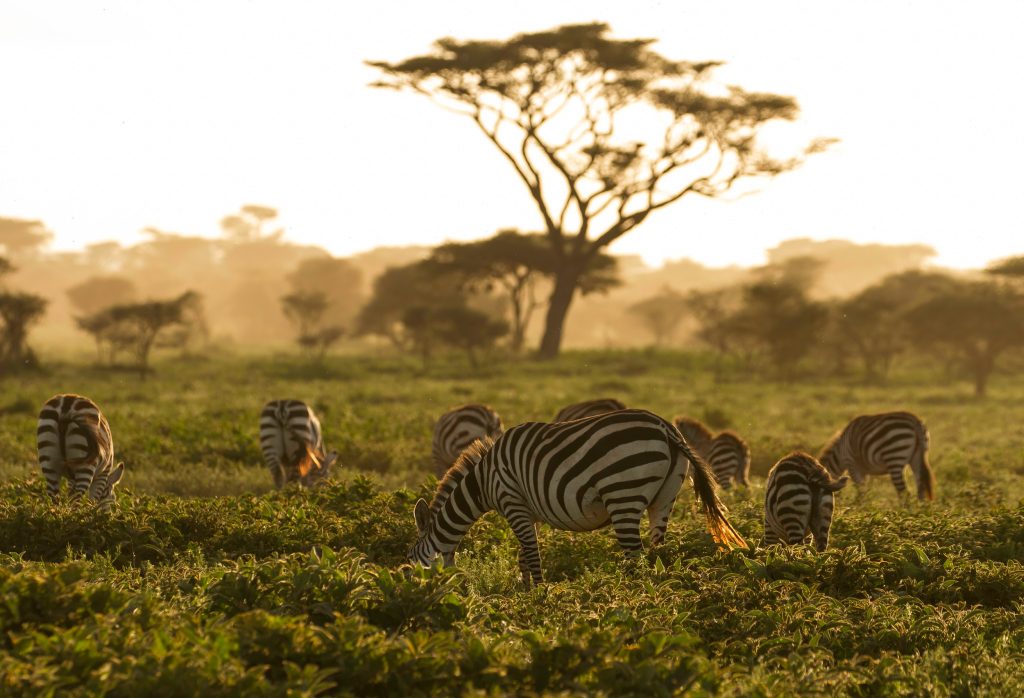
Lake Manyara National Park, located in northern Tanzania at the base of the Great Rift Valley escarpment, covers about 330 km², with two-thirds of its area occupied by the shallow alkaline lake. Famous for its dramatic landscapes, lush groundwater forests, and rich wildlife, the park offers a unique safari experience. It is renowned for tree-climbing lions, large flocks of flamingos, diverse bird species (over 400 recorded), elephants, giraffes, hippos, and playful baboon troops. The park is easily accessible, making it a popular stop on the northern safari circuit.
Game Drives – Explore the park to spot tree-climbing lions, elephants, zebras, giraffes, and wildebeest.
Bird Watching – Ideal for ornithologists with flamingos, pelicans, hornbills, and migratory species.
Canoeing (Seasonal) – Paddle on Lake Manyara waters (when water levels are high) for a unique perspective of wildlife.
Nature Walks – Guided walks along forested trails and hot springs to experience flora and fauna up close.
Cultural Tours – Visit nearby Mto wa Mbu village for traditional food, art, banana plantations, and local market experiences.
Treetop Canopy Walkway – A suspended bridge high among the trees, offering a bird’s-eye view of the forest and wildlife.
Photographic Safaris – Capture diverse landscapes, wildlife, and birdlife with spectacular Rift Valley backdrops.

Dry Season: June to October
Pleasant temperatures, sunny skies, and little rain.
Best for wildlife viewing — animals gather around rivers and waterholes.
Short Rain Season: November to December
Brief showers, mainly in the afternoons — still good for safari.
Long Rain Season: March to May
Heavy rains; some lodges close due to muddy roads and reduced accessibility.
Fewer tourists and lower prices.
High Season (more tourists): June to October & December to February
Perfect weather and peak wildlife visibility.
Low Season (fewer tourists): March to May
Rainy season — ideal for budget travelers and photographers who love green landscapes.
January to February: In the Southern Serengeti (Ndutu area) —
Thousands of wildebeest give birth.
Excellent time to see predator action (cheetahs, lions, hyenas).
December to April: Southern Serengeti (Ndutu area) — calving season.
May to June: Central Serengeti — herds move north.
July to September: Northern Serengeti & Masai Mara — river crossings at the Grumeti and Mara Rivers.
October to November: Return southward to the Serengeti.
Passport + copies
Travel insurance documents
First-aid kit: antiseptic, painkillers, anti-diarrheal meds, band-aids, motion sickness tablets, mosquito repellent
Prescription medication (in original packaging)
Sun protection: sunscreen (SPF 30+), hat, sunglasses
Camera + extra batteries/memory cards
Binoculars
Reusable water bottle
Small backpack for daily game drives
Lightweight flashlight/headlamp
Universal power adapter
Neutral colors: khaki, beige, olive, brown (avoid bright colors and dark blue/black — attract insects).
Lightweight, breathable long sleeves and trousers for sun and insect protection.
Light jacket or fleece for cool mornings and evenings.
Comfortable closed shoes or hiking boots.
Hat with wide brim.
Swimsuit if your lodge has a pool.
Respect local culture: modest clothing (avoid short shorts or low tops).
Light, casual clothing for warm weather.
A light sweater or jacket for evenings.
Currency: Tanzanian Shilling (TZS).
You can withdraw cash using ATMs in major towns (Arusha, Moshi, Dar es Salaam).
Best banks: CRDB, NBC, NMB.
Use Visa cards — Mastercard may not always work.
Minimize fees:
Withdraw larger amounts at once (max ~400,000–1,000,000 TZS per transaction).
Use ATMs with low international charges (check with your bank).
USD is widely accepted for hotels and park fees — bring clean, post-2009 bills.
Lodges and camps provide full-board or half-board (breakfast, lunch, dinner).
Expect a mix of continental and local dishes:
Rice, beans, ugali (maize porridge), grilled meats, vegetables, tropical fruits.
Vegetarians and special diets are well accommodated (inform your operator in advance).
Bottled or filtered water is always recommended.
Lodges and camps provide full-board or half-board (breakfast, lunch, dinner).
Expect a mix of continental and local dishes:
Rice, beans, ugali (maize porridge), grilled meats, vegetables, tropical fruits.
Vegetarians and special diets are well accommodated (inform your operator in advance).
Bottled or filtered water is always recommended.
Most safari companies and lodges accept:
Bank transfer (SWIFT)
Credit/debit card (Visa/Mastercard; 3–5% surcharge)
Cash in USD (for tips or local payments)
Always confirm the payment method and currency before sending money.
Avoid sending money through unofficial links or unverified accounts.

© 2023 all right with tanzania with keny